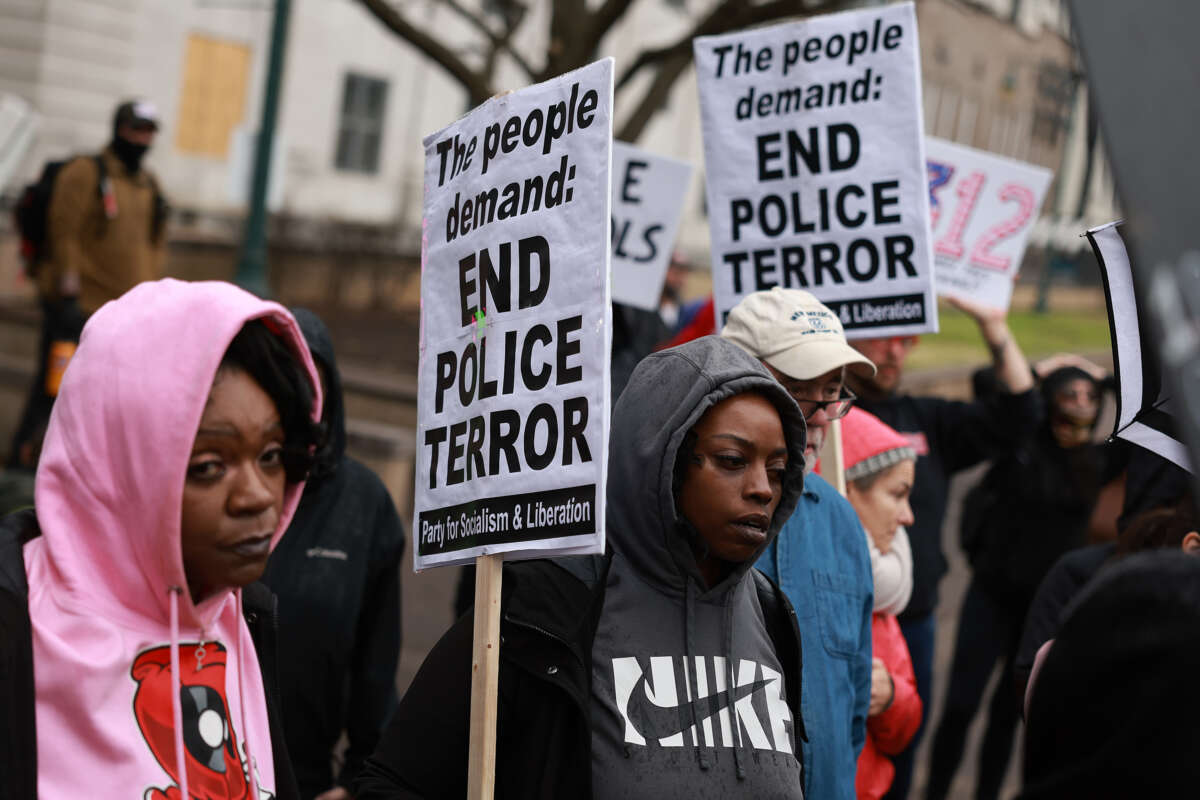The Tennessee legislature passed a bill on Thursday that would weaken police oversight in the state and dissolve community-led oversight boards in Memphis and Nashville.
Racial justice and civilian oversight advocates have denounced the bill as a legislative attempt to muzzle independent investigations into police, saying it would “abolish civilian oversight and undermine the will of the people.”
Rep. Justin Jones (D) has said that the legislation will “undo the will of Nashville voters,” referring to a ballot measure that Nashville voters introduced in 2018 in response to the police killings of Jocques Clemmons and Daniel Hambrick. The measure, which passed with 59 percent of the vote and established a civilian oversight board, will be overturned if Governor Bill Lee (R) signs the new bill into law.
“It’s gonna get worse,” said Sheila Clemmons Lee, the mother of Jocques Clemmons, a 31-year old who Nashville police killed in 2017. “They’ll continue to get away with murder after murder after murder after murder.”
The bill, which passed the Senate earlier this month, was introduced by legislators just weeks after the brutal police killing of Tyre Nichols in January and passed the legislature in the wake of a recently filed $550 million civil lawsuit against the city of Memphis by Nichols’s mother.
After police officers murdered Nichols, members of Memphis’s Civilian Law Enforcement Review Board (CLERB) and Community Oversight Nashville (CON) demanded increased oversight of and larger budgets for investigations into police actions. Community oversight boards, like CLERB and CON, are independent agencies that have the authority to investigate allegations of misconduct filed by the public against police departments. If the governor signs the bill into law, it would completely abolish community oversight boards as they currently operate and end any ongoing investigations they may be conducting.
“When we resist putting in strong civilian oversight to make sure police are accountable for their actions, we are ignoring the cries of the people,”said Kirkwood, a retired colonel who is now president of CLERB after spending 30 years with the Memphis Police Department.
Of the hundreds of police complaints made over the past few years, CLERB has only been able to hear 16 cases because of staffing and budget constraints. In addition, CLERB is limited in its ability to conduct investigations because it does not have the power to subpoena officers itself but must rely on the city council member who sits on CLERB to do so. Because of these concerns and limitations, Kirkwood has called for city council members to allocate more funding to the board.
“Police misconduct is real! It’s real! And we have to do something about it,” he said.
Instead of investing in community oversight boards, the Tennessee legislature’s bill would give mayors unilateral power to handpick candidates who sit on the boards, prevent boards from having investigatory authority, prevent boards from requiring representation from impacted communities, and prevent boards from having their own legal advisor separate from the city’s legal department. Additionally, the legislation would prevent boards from reviewing investigations concerning any incident that occurred prior to July 1, 2023, including the murder of Nichols.
In 2022, more than 1,000 people were killed by police across the country, making it the most dangerous year of police violence, according to Mapping Police Violence, a nonprofit independent research collaborative collecting data to quantify the impact of police violence on communities. Only 9 officers were charged with a crime — making up only 1 percent of all killings by police — and most of the killings began with police responding to a suspected non-violent offense or to a situation in which no crime was reported.
In Tennessee, from 2013 to 2021, there were 240 killings by police and 2,646 complaints of police misconduct, according to the Police Scorecard, the first nationwide public evaluation of policing in the United States. A Black person was 1.6 times more likely to be killed by police than a white person.
“This bill essentially strips away police accountability in our state, at the height of a police killing that was so tragic and brutal,” said Jill Fitcheard, the director of Nashville’s Civilian Oversight Board. “These state legislators want to cut away oversight and police accountability and dwindle it down until it’s nothing.”
Join us in defending the truth before it’s too late
The future of independent journalism is uncertain, and the consequences of losing it are too grave to ignore. To ensure Truthout remains safe, strong, and free, we need to raise $43,000 in the next 6 days. Every dollar raised goes directly toward the costs of producing news you can trust.
Please give what you can — because by supporting us with a tax-deductible donation, you’re not just preserving a source of news, you’re helping to safeguard what’s left of our democracy.
